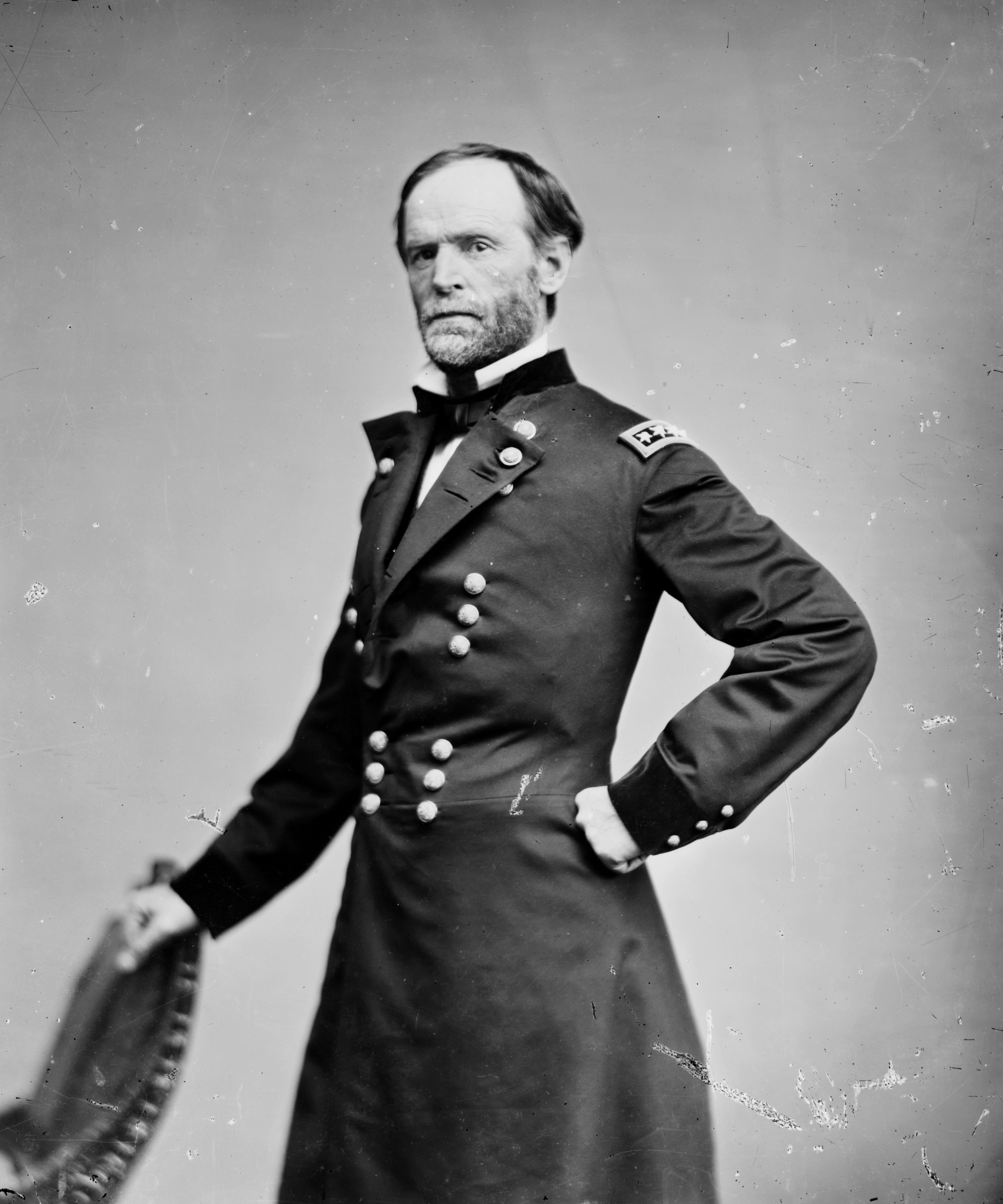If drafted, I will not run; if nominated, I will not accept; if elected, I will not serve (ang.)
pierwsze tzw. oświadczenie shermanowskie nazwane tak na cześć tej wypowiedzi – Sherman odmawiał w ten sposób kandydowania na urząd prezydenta wbrew namowom niektórych ludzi.
Źródło: John F. Marszalek, Encyclopedia of the American Civil War: A Political, Social, and Military History, Santa Barbara 2002, s. 1769.
William Sherman słynne cytaty
wyruszając w stronę wybrzeża po zajęciu Atlanty.
Źródło: Nigel Cawthorne, Dowódcy i generałowie. Prawdziwe historie, Grupa Wydawnicza Foksal, Warszawa, 2014, s. 131.
tak Sherman napisał do prezydenta Abrahama Lincolna po dotarciu 22 grudnia 1864 do Atlantyku.
Źródło: Nigel Cawthorne, Dowódcy i generałowie. Prawdziwe historie, Grupa Wydawnicza Foksal, Warszawa, 2014, s. 131.
William Sherman: Cytaty po angielsku
Interview in Harper's Weekly (24 June 1871).
1870s, 1871, Interview (June 1871)
[The actual messages were "Sherman is coming. Hold out," and "General Sherman says hold fast. We are coming."[citation needed] This was changed to "Hold the fort" in a popular hymn by Philip Paul Bliss.]
Signal to Gen. John M. Corse at Allatoona (5 October 1864)
1860s, 1864, Signal to John M. Corse (October 1864)
1860s, 1864, Letter to Henry W. Halleck (September 1864)
Źródło: Letter to Henry W. Halleck https://books.google.com/books?id=HzBCAAAAIAAJ&pg=PA367&dq=%22war+is+war+and+not+popularity+seeking%22++%221864%22&hl=en&sa=X&ei=mtOiVfTpC4uqogTytKPoBQ&ved=0CB0Q6AEwAA#v=onepage&q=%22war%20is%20war%20and%20not%20popularity%20seeking%22%20%20%221864%22&f=false (September 1864).
“I will not accept if nominated, and will not serve if elected.”
Telegram sent to General Henderson in 1884, refusing to run in the United States presidential election of that year. As quoted in Sherman's Memoirs, 4th ed. 1891. This is often paraphrased: If nominated, I will not run; if elected, I will not serve.
1880s, 1884, Telegram (1884)
Telegraph to Abraham Lincoln (December 1864), as quoted in Southern Storm: Sherman's March to the Sea https://en.wikipedia.org/wiki/Special:BookSources/0940450658 (2008), by Noah Andre Trudeau, New York: HarperCollins, p. 508.
1860s, 1864, Telegram to Abraham Lincoln (December 1864)
“Letter to his wife (2 June 1863), as quoted in "The Oxford Dictionary of American Quotations" (2005) edited by Hugh Rawson and Margaret Miner.”
Vox populi, vox humbug.
1860s, 1863, Letter (June 1863)
Letter to Sheridan (November 1864)
1860s, 1864
1860s, 1864, Letter to James Guthrie (August 1864)
1860s, 1864, Letter to James Guthrie (August 1864)
Retort to a lady of Confederate sympathies, who berated him for the wasting of Mississippi by the Army of the Tennessee during the Meridian Campaign ; cited in The Civil War Generation, Norman K. Risjord, Rowman & Littlefield (2002), p. 143 : ISBN 0742521699</small> , and in Fateful Lightning: A New History of the Civil War and Reconstruction, Allen C. Guelzo, Oxford University Press (2012), p. 439 : <small>ISBN 0199843295
1860s, 1864
He cannot be subjected to conscription, or forced military service, save by the written orders of the highest military authority of the department, under such regulations as the President or Congress may prescribe. Domestic servants, blacksmiths, carpenters, and other mechanics, will be free to select their own work and residence, but the young and able-bodied negroes must be encouraged to enlist as soldiers in the service of the United States, to contribute their share toward maintaining their own freedom, and securing their rights as citizens of the United States.
1860s, 1865, Special Field Order No. 15 (January 1865)
1860s, 1864, Letter to the City of Atlanta (September 1864)
1860s, 1864
Źródło: Retort to a lady of Confederate sympathies, who berated him for the wasting of Mississippi by the Army of the Tennessee during the Meridian Campaign ; cited in The Civil War Generation, Norman K. Risjord, Rowman & Littlefield (2002), p. 143 : ISBN 0742521699 , and in Fateful Lightning: A New History of the Civil War and Reconstruction, Allen C. Guelzo, Oxford University Press (2012), p. 439 : ISBN 0199843295
